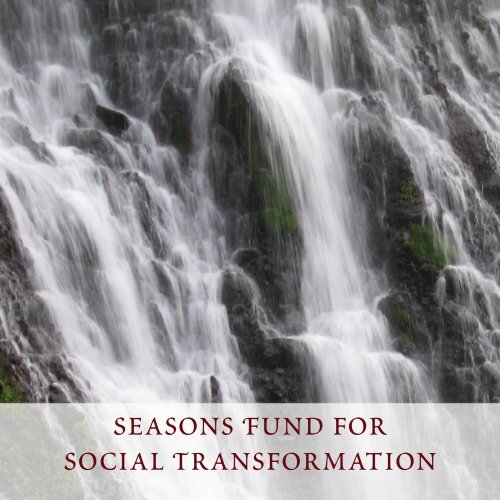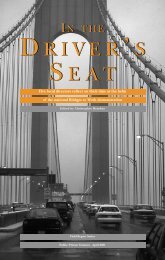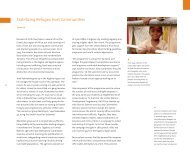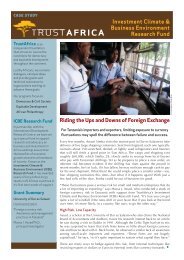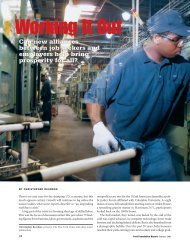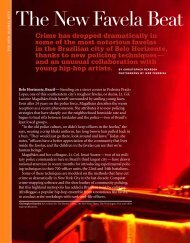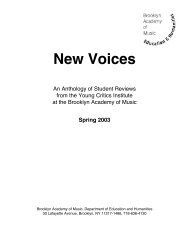Seasons Fund for Social Transformation - christopher reardon
Seasons Fund for Social Transformation - christopher reardon
Seasons Fund for Social Transformation - christopher reardon
- No tags were found...
You also want an ePaper? Increase the reach of your titles
YUMPU automatically turns print PDFs into web optimized ePapers that Google loves.
<strong>Seasons</strong> <strong>Fund</strong> <strong>for</strong><strong>Social</strong> Trans<strong>for</strong>mation
“One of the great problems of history is that theconcepts of love and power have usually beencontrasted as opposites—polar opposites—so thatlove is identified with a resignation of power, andpower with a denial of love…. What is needed isa realization that power without love is recklessand abusive, and that love without power issentimental and anemic. Power at its best is loveimplementing the demands of justice, and justiceat its best is power correcting everything thatstands against love.”— Dr. Martin Luther King Jr.
James Whitehead<strong>Seasons</strong> <strong>Fund</strong> <strong>for</strong><strong>Social</strong> Trans<strong>for</strong>mationGandhi did it. So did King. And Black Elk and Jane Addams and César Chávez. In thecourse of changing the world around them, each of these visionary leaders sought and achieved akind of personal trans<strong>for</strong>mation, opening their hearts and minds and embracing a fundamentallynew outlook on life. In different ways, they cultivated a quality that has been variously described asheightened consciousness, inner awareness, spiritual awakening or universal, unconditional love.By any name, it is the driving <strong>for</strong>ce behind some of the most effective social movements of the lastcentury—a catalyst that transcends ego, instills a deep sense of connection with others, and revealsfresh possibilities <strong>for</strong> structural change.
Without a revolution of the spirit, the <strong>for</strong>ces which produced theiniquities of the old order would continue to be operative, posinga constant threat to the process of re<strong>for</strong>m and regeneration.— Aung Sang Suu KyiIn more recent years, re<strong>for</strong>mers like Nelson Mandela, Aung San Suu Kyi and others in the United Stateshave carried on this inspiring legacy by countering oppression with dignity and grace. There are countlessothers serving society in this tradition whose names we will never know. Still, there is a sense that whilemany organizers and activists are working harder than ever, the progress they achieve is hard to sustain.It’s easy to fault the larger culture, as commercial interests eclipse communal needs and social changeorganizations face urgent demands, competition <strong>for</strong> funding, and burn out among their staff and members.“We’re kidding ourselves if we think this frenzied antagonism is getting us somewhere,” says Ng’ethe Maina,a veteran organizer who believes the time has come <strong>for</strong> a new kind of leadership. “If we really want to winbroad changes in society, we’ve got to be willing to change ourselves too.”A growing number of US social change agents are shedding old habits and asking new questions. What if weset aside our inhibitions, they ask, and our anger and fear?What if we truly listened to our colleagues—and ouradversaries? Suppose we allowed <strong>for</strong> the possibilitythat we don’t have all the answers, and may evenbe asking outdated and outmoded questions?Through the ages, human civilizations haveproduced a rich set of contemplative practicesand leadership skills that can help people to askand answer these questions by bringing greaterawareness, intentionality, and equanimity totheir work. Yet community-based groups,laboring on the margins of society with limitedresources, have had few ways to access them,until now.
A different approachThe <strong>Seasons</strong> <strong>Fund</strong> <strong>for</strong> <strong>Social</strong> Trans<strong>for</strong>mation arises from a realizationthat action is not enough. No matter how many projects and campaigns and initiatives andalliances we set in motion, we won’t find fundamental solutions to societal ills until we learn how toapproach this work with greater awareness, compassion, and humility.Wider access to management training and leadership development can help overcome some of the internalproblems that weaken and limit social change organizations, from poor planning and weak strategic analysisto lack of per<strong>for</strong>mance standards. But it’s going to take more than technical interventions. We must alsobring the right intention and presence to our jobs. Many of us can point to a <strong>for</strong>mative moment orexperience that awakened our political consciousness, often leaving us wounded and angry. Such pain is oftentranslated into the fuel that powers trans<strong>for</strong>mative approaches to social change, but when we leave thesenegative emotions unexamined, unexplored, and unhealed, the solutions we devise can be fraught withresentment and bitterness. We may even end up reproducing the divisiveness and hate we set out to mend.
“Marrying a rich inner life dedicated to the cultivation of lovingkindness and compassion with the practice of new <strong>for</strong>ms of politics,economics, and public policy is the key to social trans<strong>for</strong>mation.”— Michael EdwardsBut there is another way. Our best hope lies in combining our passion <strong>for</strong> justice with contemplativepractices and the best possible management and organizational development skills. Some people may swearby a particular technique, but there are enough alternatives—from every tradition—to suit almost anyone.Incorporating these practices into daily life, reconnecting with our values and motivations, and creating morealignment between inner and outer work can result in radical trans<strong>for</strong>mation <strong>for</strong> men and women laboringon the front lines of social change. Over time, they can deepen their capacity to lead and achieve moresustainable results. We can also utilize these approaches within our organizations to achieve the same resultson a much larger scale.History shows that personal and social trans<strong>for</strong>mation are inseparably linked and mutually rein<strong>for</strong>cing, andthat it’s vital to move from contemplation to action and back again. Gandhi, fasting on the final night of theSalt March, knew this. So did King, engaging in solitaryprayer just be<strong>for</strong>e he gave himself over to theBirmingham City Jail. But it wasn’t justthem; many of their movementcolleagues embraced these practices too.The challenge now is to identify, andmake more widely available, a rangeof tools and resources that can helpsocial change organizations integratethis approach into their work. Tothat end, the <strong>Seasons</strong> <strong>Fund</strong>mobilizes resources, makes grants,and supports learning activities tostrengthen and shed new light onthe connections between personaland social trans<strong>for</strong>mation.
James WhiteheadRipple effectsLike a droplet of water that ripples outward, personal trans<strong>for</strong>mation can touch offa wondrous series of events. When conditions are right, it can lead to more effective organizations, strongercoalitions, healthier individual change agents, and more positive working relationships. It may even presage amore cohesive social change movement, and ultimately a more equitable, peaceful, and sustainable society.Many agents of social change begin with individual practices that foster awareness and presence. Some ofthese exercises, like sitting meditation and centering prayer, quiet the mind through stillness and silence.Others relax and stabilize the body through movement exercises like yoga, tai chi, and walking meditation.Still others incorporate painting, prayer, or ritual to generate a sense of creativity, devotion, or compassion.For some activists, these practices may have a spiritual dimension, connecting the inner life of the spirit withthe outer life of action. For others, they are secular activities that open the heart and clear the mind.
“The social justice movement believes that the more we do, thebetter chance we have of winning. We over-identify with thedoing and fail to see what really needs doing.”—angel Kyodo williamsThese same principles of awareness, presence, and compassion hold tremendous promise <strong>for</strong> social changeorganizations. As people in leadership positions come to value these qualities, it becomes apparent howinternal systems and norms can drive success or failure in their work. Contemplative practices can trans<strong>for</strong>mthe way they run meetings, plan campaigns, set expectations, communicate with one another, understandpower dynamics, negotiate with adversaries, and evaluate programs. They may start to ask vital questionsabout core values and how to make them more explicit. They may introduce structured time <strong>for</strong> visioningand setting goals in a reflective atmosphere. They may explore ways to develop stronger working relationships,both internally and externally, across lines of difference. They may learn how to recognize—and deconstruct—the us-versus-them dynamic that undermines too many campaigns. As these ideas take root, the organizationitself becomes a kind of contemplative organism, one that is more capable of <strong>for</strong>ging effective coalitions andcontributing to the renewal of movements <strong>for</strong> social change.In the last dozen years, several new centers have begun offering workshops, training, and advisory servicesdesigned to foster these skills among social change organizations. Among them are stonecircles (North Carolina), the Center <strong>for</strong> Contemplative Mind in Society(Massachusetts), <strong>Social</strong> Justice Leadership (New York), and theRockwood Leadership Program and the Movement StrategyCenter (both in Cali<strong>for</strong>nia). Some of their teachings describeconventional ways to improve organizational managementand per<strong>for</strong>mance. But most go much deeper, helpingparticipants develop more effective ways of listening,communicating, building partnerships, and identifyingchallenges and opportunities in their field.Un<strong>for</strong>tunately, these institutions often lack theresources to provide the kind of assistance thatcommunity-based groups need to integrate suchpractices and skills into their work, and that’s wherethe <strong>Seasons</strong> <strong>Fund</strong> comes in.
Our missionThe <strong>Seasons</strong> <strong>Fund</strong> <strong>for</strong> <strong>Social</strong> Trans<strong>for</strong>mation invests in opportunities to couple the expansive power ofpersonal trans<strong>for</strong>mation with the public work of repairing societal ills in the United States.The <strong>Fund</strong>, a collaborative ef<strong>for</strong>t led by several private foundations, springs from a shared belief that cultivatinga rich inner life is both a worthy end in itself and an overlooked pathway to heightening the impact,effectiveness, and sustainability of social change initiatives. Together, we aim to raise at least $5 million tosupport those working <strong>for</strong> social, economic, and environmental justice to embrace a range of contemplativepractices that can deepen their capacity to lead.Our core valuesEach contributor to the <strong>Seasons</strong> <strong>Fund</strong> brings their own perspectives and priorities to the table, and we honorthese differences, but we also hold many essential values in common. We believe that reflection and inquiry—at the personal, institutional, communal, and societal levels—can open the door to insight, foster a profoundsense of possibility, and fuel concrete changes in our society. We also believe that actions born of hope andempathy, rather than unprocessed fear and anger, are more likely to achieve lasting equality, justice, andpeace.As our work together moves <strong>for</strong>ward, we remain committed to these principles:How we work• recognizing our interdependence,• engaging in shared learning and reflection,• cultivating an atmosphere of love and joy, and• maintaining transparency, accountability, and trust.The <strong>Seasons</strong> <strong>Fund</strong> makes grants to help agents of social change view themselves, their work, and the worldaround them in a new light. Specifically, we support opportunities <strong>for</strong> reflection and training aimed atfostering personal trans<strong>for</strong>mation, building leadership skills, promoting organizational development, <strong>for</strong>gingeffective coalitions, and cultivating new ways of envisioning our society. We also support ef<strong>for</strong>ts to evaluatethe impact of contemplative practices on social change initiatives.
The <strong>Fund</strong> is governed by a board of individuals representing each of the institutions that have committed atleast $50,000 per year. The board is responsible <strong>for</strong> setting overall strategies and advising on grants. The<strong>Fund</strong> is housed at Jewish <strong>Fund</strong>s <strong>for</strong> Justice, which serves as our fiscal sponsor. This arrangement allows us tostreamline our operations, but in no way indicates a religious affiliation.Because there is still so much to learn, the <strong>Seasons</strong> <strong>Fund</strong>’s contributors participate in an independentWorking Group on <strong>Social</strong> Trans<strong>for</strong>mation, a network of funders and practitioners striving to learn moreabout contemplative practices and how they might advance social change, chaired by Claudia Horwitz ofstone circles and Alta Starr of the Ford Foundation.Who we areThe <strong>Seasons</strong> <strong>Fund</strong> began with a core group of six donors, ranging from relatively small family foundations tomidsize operating foundations and large private foundations. Each of these institutions holds one seat on ourboard:Fetzer InstituteFord FoundationHidden Leaf FoundationJewish <strong>Fund</strong>s <strong>for</strong> JusticeW.K. Kellogg FoundationSeeds of Justice <strong>Fund</strong>Tom Callanan, Program OfficerGuillermina Hernandez-Gallegos, Senior Program Officer (seat shared)Michael Edwards, Director, Governance and Civil SocietyAlta Starr, Program Officer, Governance and Civil Society (seat shared)Tara Brown, DirectorSimon Greer, President/CEOMolly Schultz Hafid, Director of Grantmaking Programs (seat shared)Paula Sammons, Program Associate, Youth and Educationangel Kyodo williams, DirectorThe interim co-chairs of the board are Tara Brown and Michael Edwards.An invitationWe warmly welcome other funders into our circle. There is no minimum contribution. New partnersinterested in joining the <strong>Fund</strong> may contact any of our board members or our program consultant:Sarah Ghiorse369 Montezuma Avenue #507, Santa Fe, NM 87501-2626(505) 983-2254 • seasonsfund@gmail.comThose interested in applying <strong>for</strong> grants should also contact Sarah Ghiorse.
CASE STUDYBUILDING AWARENESSMake the Road by Walking is a community-based group that promotes economic justice and opportunityin New York City. Based in the Bushwick section of Brooklyn, it began in 1997 by organizing immigrantwelfare recipients, but soon expanded its focus to combat the systemic economic and politicalmarginalization of residents throughout the city.“Our vision is to build leadership from the grassroots,”says Oona Chatterjee, the group’s co-director. “We think this is the way to bring about changes thatbenefit low-income New Yorkers.”In the last year or so, Make the Road has made significant refinements in the way it provides legal services,emergency food, English classes, youth programs, and academic assistance—enabling it to servea larger population more effectively than ever be<strong>for</strong>e. The group owes some of its recent success to<strong>Social</strong> Justice Leadership (SJL), which conducts six-month training programs <strong>for</strong> social change agentsin New York City. “We’re working to build a new generation of grassroots leaders with the individualand organizational skills, analysis, and competency to lead a renewed social justice movement,” saysits director, Ng’ethe Maina.To that end, SJL provides training, organizational development, and assistancein developing alliances to community-based groups throughout the metropolitan area.Make the Road was in need of some help. In less than a decade, it has grown from an all-volunteerorganization to one with a full-time staff of 27 plus a membership base of some 2,100 community residents.Througha series of SJL courses in leadership, Chatterjee, fellow co-director Andrew Friedman,and two of their colleagues upgraded their skills in the areas of management and trans<strong>for</strong>mative leadership.They say their ability to communicate with and manage their staff has greatly improved.Moreover, their coworkers have learned to value authenticity and presence when communicating withone another. “For a long timethe organization was smallenough that personal relationshipsand individual drive madeit grow and held it together,”Chatterjee recalls. “But whenyou get to a certain size, youneed systems and structures tomake that possible.The lessonswe learned at SJL provided thesystems and structures toretain the feeling of dynamismand humanity while working ona much larger scale.”
“We need new waysof imagining oursociety.”— Alta StarrWith a critical mass attuned to the value of personal awareness andcontemplative practices, Make the Road has seen its institutional culturemature considerably. Senior managers are using what they learnedto reshape the way the organization works. They recently adopted severalmodels <strong>for</strong> planning, staff management, and staff developmentintroduced during the SJL programs. A new method <strong>for</strong> identifying keyresults and building programs around them has been particularly usefulin clarifying staff responsibilities and priorities. “Setting those goalshas pushed us to a new level of per<strong>for</strong>mance,” Chatterjee says. “Whenwe articulated that stuff, we were able to sort it out by who was hereto do the work and assign the work to people in a systematic way. Italso allows people to evaluate their work according to these statedgoals, and it makes it possible <strong>for</strong> our board to evaluate our work effectivelyinstead of anecdotally.”She and her colleagues aim to continue their work with SJL, whose lessonshave helped them work more effectively <strong>for</strong> social change. “Theopportunity to reflect and be challenged is crucial, but it doesn’t happenvery often,” says Chatterjee. “The world we’re working in indicatesthat we need pretty ambitious and trans<strong>for</strong>mative solutions, and theyneed to be developed. If people aren’t stopping to think, then peoplearen’t going to be able to innovate.”www.maketheroad.orgwww.sojustlead.org
CASE STUDYMAKING CONNECTIONSFor a grassroots organization, the only thing harder than cutting back is expanding rapidly. Just askDiana Autin, co-director of the Statewide Parent Advocacy Network of New Jersey, which supportschildren and families affected by poverty, disability, and discrimination. Several years ago, a period ofheavy growth nearly overwhelmed the network, as it went from 12 employees in a single office to 40staff members spread across six locations. “People working here identified more with their projectsthan with SPAN as a whole,” Autin recalls. “They knew what other projects were doing, but it waswith their head, not their heart.”As confusion mounted and morale waned, it was only a matter of time be<strong>for</strong>e families relying on thenetwork noticed something was amiss.To regain a sense of cohesion, Autin and her colleagues turnedto Claudia Horwitz, the director of stone circles in Durham, N.C. Horwitz founded it in 1995 to sustainactivists and strengthen their work <strong>for</strong> justice through spiritual practices and principles.“If we’reinterested in liberation in the world,” she explains, “then we need to be able to cultivate a sense offreedom on the inside.”While leading a two-day retreat at SPAN, Horwitz set up an exercise she called Stations of Reflection,posing a series of questions like: What brought you to this work? Are there beliefs you have neverwavered from in your life? How do those beliefs come to life on a day-to-day basis? “Almost immediatelyyou could feel shoulders relaxing,” says Autin, as staff members began “thinking and reflecting,thinking back to their children and their own frustration and hurt, how they got help, and how thatmade them want to help others.”The next day’s leadership retreat focused on theorganizational culture: its strengths and whatpeople wanted to see changed. SPANintroduced a new meeting structuredesigned to build emotional connections,<strong>for</strong> example, and staffmembers took the initiative in<strong>for</strong>ming new committees to tackleemerging issues. Ensuing discussionshelped staff memberssee each other from a new perspective,no longer defined solelyby work roles. Exploring howinner values and beliefs affected
“My vision is <strong>for</strong>a progressivemovement in thiscountry that isrooted in a senseof love and valueand a place ofinner wisdom,where peoplearen’t actingfrom anger andreactiveness butrather from whatthey truly careabout—frompassion, truepassion.”— Tara Browntheir commitments and their work soon led them to speak of “theSPAN family,” a notion that has redefined the office culture.Meanwhile, the newfound sense of trust has provided a needed outlet <strong>for</strong>SPAN’s hotline operators, who can become worn down by callers needinghelp with acute personal crises; now operators can ask colleagues<strong>for</strong> support and know they will get it.Significantly, the network has developed a much more comprehensiveset of services. Where it once focused on helping children with specialneeds navigate the educational system, SPAN now offers resourcesrelated to health, parent training and support, public policy issues, disabilityissues, and violence prevention. It is also looking beyond thesechildren and their parents to focus on entire families, including overlookedsiblings.SPAN has since won national recognition <strong>for</strong> its ability to strengthenconnections between parent centers and state education systems. Autintraces this success back to the retreat and follow-up training with stonecircles.“It’s an outgrowth of the work we did in thinking about ourselvesand about what enables us to do what we do,” she says. “We’re thinkingof ourselves as a family and taking it out into the larger world.”www.spannj.orgwww.stonecircles.org
CASE STUDYGETTING RESULTSAs a relatively small environmental advocacy group, ForestEthics can’t af<strong>for</strong>d to waste time on thingsthat don’t advance its mission. Its clear focus has yielded some striking achievements in the last fewyears. With a staff of 30 and an annual budget of less than $3 million, the San Francisco-based grouppersuaded Staples to phase out paper products originating from endangered <strong>for</strong>ests. It got Home Depotto stop selling lumber cut from native woodlands. And it recently swayed Limited Brands, the $10 billionclothing retailer that owns Victoria’s Secret, to stop buying pulp from Canada’s Boreal Forest andstart using more certified and recycled paper. For a company that mails nearly 1 million catalogs eachday, it was a major policy change.Todd Paglia, ForestEthics’ executive director, attributes these breakthroughs to an approach that isdecidedly rare in his field. “We don’t treat company representatives like they’re evil,” he says. “Evenwhile we’re campaigning against companies in really aggressive ways, we spend a tremendous amountof time investing in relationships with the people who are hopefully going to be our contacts <strong>for</strong> yearsafterward in order to implement the changes we create together.”ForestEthics was not always so enlightened. But in recent years it has put considerable ef<strong>for</strong>t intotrans<strong>for</strong>ming its institutional culture. Most of its staff members have taken a three-day course at theRockwood Leadership Program in nearby Berkeley to develop their management skills and establish acommon language among coworkers. The course includes practical exercises in team building andassessment as well as deeper <strong>for</strong>ays into organizational visioning, inner alignment, self-care, and contemplativediscipline. Significantly, ForestEthics continues to build on this work by regularly bringing inmentors like Robert Gass and William Ury to help its staff expand their capacity to innovate, communicate,and lead.With the vision and tools its staff has cultivated,ForestEthics has developed aremarkable knack <strong>for</strong> turning its purportedcorporate adversaries into allies. In itsrecent campaign to change the paper procurementpolicy at Limited Brands,ForestEthics publicly took an adversarialpose. It ran a provocative series of newspaperads—titled “Victoria’s Dirty Secret”—that resembled Victoria’s Secret’s ownmarketing materials. But there were somenoticeable differences: the models acces-
“By staying connectedto our purpose,by keeping ourhearts open andminds clear, we arefar more likely toactually play ourpart in creating abetter world.”—Robert Gasssorized their lingerie with chainsaws, and the adjacent text called attentionto where the company got its paper.Behind the scenes, Paglia and his colleagues were busy building relationshipswith people inside the company. “Years ago people told us itwouldn’t work, that you either work with companies or you workagainst them, and I always thought that was a false choice,” he says.“If you do it right they can respect you and have a little bit of fear, andthere’s nothing wrong with that. You don’t need to be buddies, but youdo need to have respect. That’s more important, and that’s the waywe’ve tried to orient our communications with the companies behind thescenes.”ForestEthics reached a deal in December 2006, with Limited Brandsagreeing to dramatically alter its paper sourcing policies. But the companyhas gone even further by seeking advice from ForestEthics, lobbyingthe Canadian government to tighten regulation of the paper industry,and urging other catalog companies to follow its lead. None of thatwould have happened, Paglia says, if he and his colleagues had taken amore hostile approach. “We don’t feel like we’re beating people,” hesays. “We feel like we’re waking them up.”www.<strong>for</strong>estethics.orgwww.rockwoodfund.orgWayne Sawchuk
“Working <strong>for</strong> justice with a loving heart,we sustain hope and courage; cultivatingour heart and soul, we see clearly and areimpelled to seek justice.”—Rabbi Rachel Cowan
<strong>Seasons</strong> <strong>Fund</strong> <strong>for</strong> <strong>Social</strong> Trans<strong>for</strong>mation369 Montezuma Avenue #507Santa Fe, NM 87501-2626(505) 983-2254seasonsfund@gmail.comWritten by Christopher Reardon. Design by Design Action Collective. Printed on 100% recycled paper.


